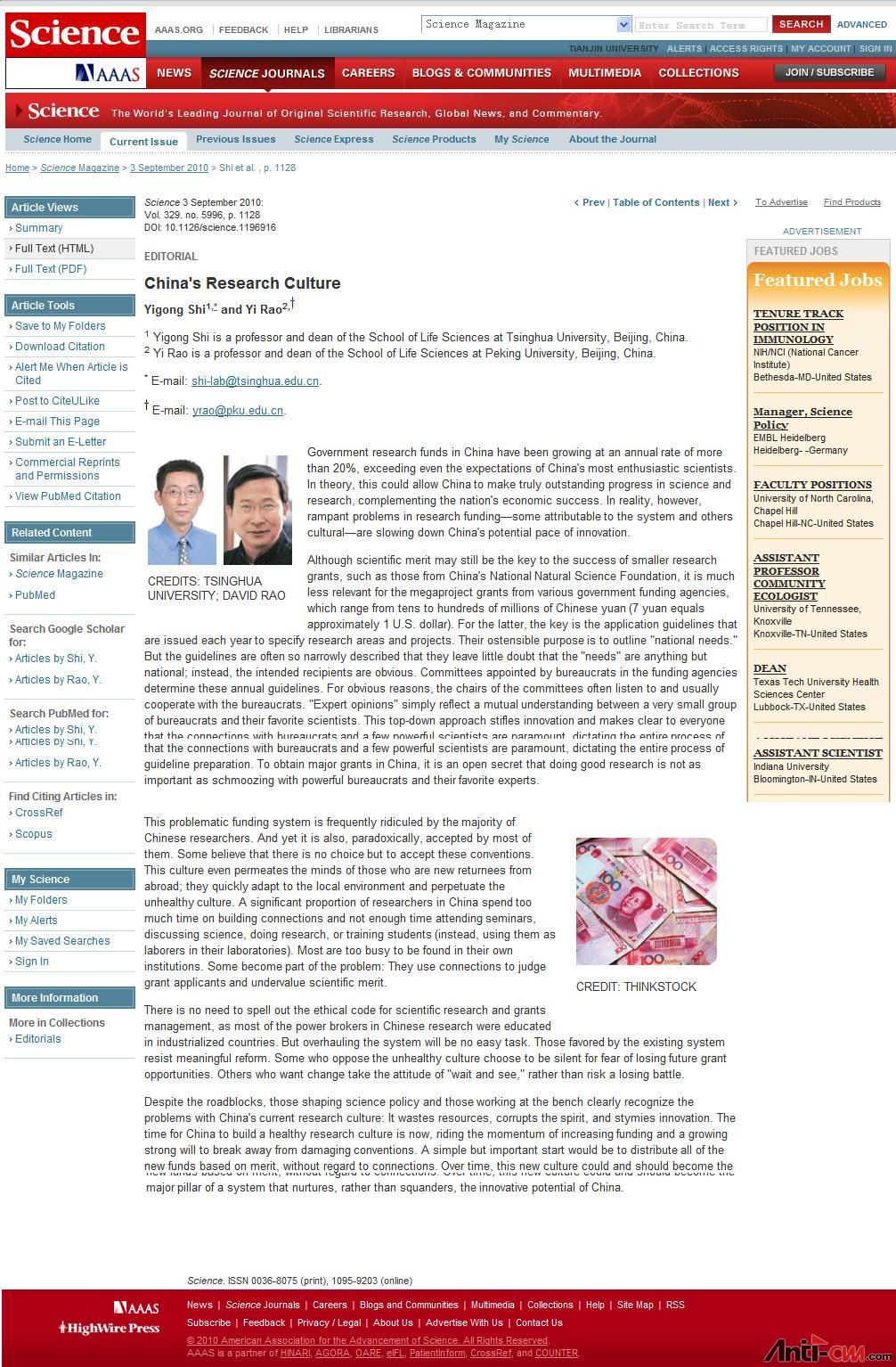|
|
本帖最后由 realgen 于 2010-9-4 20:51 编辑
摘要:清华大学生命科学学院院长和北京大学生命科学学院院长联手在世界顶尖(Top2)科技期刊《Science》(即《科学》)上发表editoral(述评),抨击中国先科研项目审批过程中的种种弊端,一针见血。
原文地址:http://www.sciencemag.org/cgi/content/full/329/5996/1128
pdf地址:http://www.sciencemag.org/cgi/reprint/329/5996/1128.pdf
由于一些数据库需要购买,我不知道上述两个连接能否能都在任何地方打开。
Science 3 September 2010:
Vol. 329. no. 5996, p. 1128
DOI: 10.1126/science.1196916
EditorialChina's Research Culture
Yigong Shi1,* and Yi Rao2, [size=-1]1 Yigong Shi is a professor and dean of the School of Life Sciences at Tsinghua University, Beijing, China. [size=-1]1 Yigong Shi is a professor and dean of the School of Life Sciences at Tsinghua University, Beijing, China.
2 Yi Rao is a professor and dean of the School of Life Sciences at Peking University, Beijing, China. * E-mail: shi-lab@tsinghua.edu.cn .
 E-mail: yrao@pku.edu.cn . E-mail: yrao@pku.edu.cn .

CREDITS: TSINGHUA UNIVERSITY; DAVID RAO
【“realgen”认领】Government research funds in China have been growing at an annual rate of more than 20%, exceeding even the expectations of China's most enthusiastic scientists. In theory, this could allow China to make truly outstanding progress in science and research, complementing the nation's economic success. In reality, however, rampant problems in research funding—some attributable to the system and others cultural—are slowing down China's potential pace of innovation.
【realgen的师妹“随星”认领】
Although scientific merit may still be the key to the success of smaller research grants, such as those from China's National Natural Science Foundation, it is much less relevant for the megaproject grants from various government funding agencies, which range from tens to hundreds of millions of Chinese yuan (7 yuan equals approximately 1 U.S. dollar). For the latter, the key is the application guidelines that are issued each year to specify research areas and projects. Their ostensible purpose is to outline "national needs." But the guidelines are often so narrowly described that they leave little doubt that the "needs" are anything but national; instead, the intended recipients are obvious. Committees appointed by bureaucrats in the funding agencies determine these annual guidelines. For obvious reasons, the chairs of the committees often listen to and usually cooperate with the bureaucrats. "Expert opinions" simply reflect a mutual understanding between a very small group of bureaucrats and their favorite scientists. This top-down approach stifles innovation and makes clear to everyone that the connections with bureaucrats and a few powerful scientists are paramount, dictating the entire process of guideline preparation. To obtain major grants in China, it is an open secret that doing good research is not as important as schmoozing with powerful bureaucrats and their favorite experts.
【realgen的朋友“岸上鱼”认领认领】

CREDIT: THINKSTOCK
This problematic funding system is frequently ridiculed by the majority of Chinese researchers. And yet it is also, paradoxically, accepted by most of them. Some believe that there is no choice but to accept these conventions. This culture even permeates the minds of those who are new returnees from abroad; they quickly adapt to the local environment and perpetuate the unhealthy culture. A significant proportion of researchers in China spend too much time on building connections and not enough time attending seminars, discussing science, doing research, or training students (instead, using them as laborers in their laboratories). Most are too busy to be found in their own institutions. Some become part of the problem: They use connections to judge grant applicants and undervalue scientific merit.
【realgen的弟弟“加菲猫”认领】
There is no need to spell out the ethical code for scientific research and grants management, as most of the power brokers in Chinese research were educated in industrialized countries. But overhauling the system will be no easy task. Those favored by the existing system resist meaningful reform. Some who oppose the unhealthy culture choose to be silent for fear of losing future grant opportunities. Others who want change take the attitude of "wait and see," rather than risk a losing battle.
Despite the roadblocks, those shaping science policy and those working at the bench clearly recognize the problems with China's current research culture: It wastes resources, corrupts the spirit, and stymies innovation. The time for China to build a healthy research culture is now, riding the momentum of increasing funding and a growing strong will to break away from damaging conventions. A simple but important start would be to distribute all of the new funds based on merit, without regard to connections. Over time, this new culture could and should become the major pillar of a system that nurtures, rather than squanders, the innovative potential of China.

|
中国, 文化, 科学, 科研, 中国, 文化, 科学, 科研, 中国, 文化, 科学, 科研
|